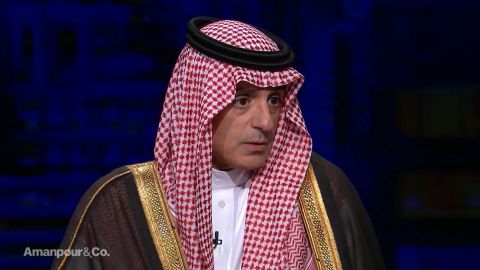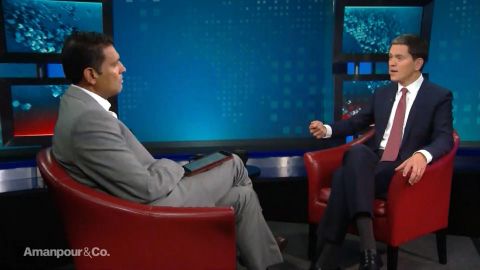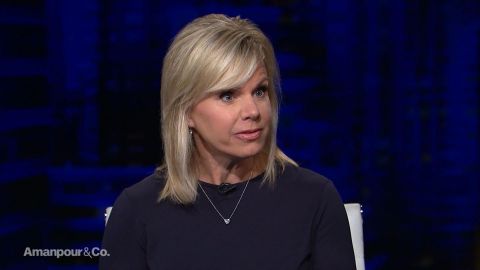Read Transcript EXPAND
HARI SREENIVASAN: David Miliband, thanks for joining us.
DAVID MILIBAND, PRESIDENT, INTERNATIONAL RESCUE COMMITTEE: Thanks for having me.
SREENIVASAN: You were just in Yemen. Impressions?
MILIBAND: It’s the world’s worst humanitarian crisis according to the statistics and it’s heartbreaking when you see it with your own eyes. I mean this is a country which was always poor. It’s got real stress from climate change but three-and-a-half years of war, 18,000 bombing raids have left the country where 80 percent of the population depend on humanitarian aid, where half the population have no access to clean drinking water, where three million kids are out of school and where the world saw the largest ever cholera epidemic last year, a million people affected. And I got this terrible sense that things are more likely to get worse than better because the fighting looks like it’s going to intensify in this critical port city of Hodeidah. I got within 450 kilometers of it. And that is the port is in the north-west of the country, 70 to 80 percent of all humanitarian supplies and commercial supplies go through there. And that is the center of the fighting at the moment, which even the Saudi-led coalition tried to reestablish the control of the holy government and the Houthi rebels who took power in 2015.
SREENIVASAN: And there’s been a challenge getting humanitarian aid in –
MILIBAND: Well, there’s a choke there. There’s a choke there. And we have good stock in court, we have — the U.N. calculates a fraction of the food, of the medicines that need to get through, are getting through despite the fact of a report of dangerous to open. Sanaa Airport which is key for commercial operations is closed. And this war is a stalemate frankly because neither side is advancing its position. The only people thriving in the chaos are extremist groups like Al-Qaeda or ISIS and the victims are these poor civilians of Yemen, seven-and-a-half thousands of them directly killed in the fighting. You reported last month of this appalling bombing or missile attack on the coach of 40 plus kids. And then you’ve got the wider ramifications for a society that’s frankly on the edge of meltdown.
SREENIVASAN: How can it be a stalemate? It seems like on the one side, the Saudi side which the U.S. supports, is lopsidedly better armed.
MILIBAND: But it’s lopsidedly strong. It’s got a total monopoly of air power but as in any asymmetric conflict, the rebel group, the Houthis who took power are dug in. They dug in the cities. They dug in Sanaa. They dug into Hodeidah and you can’t bomb your way to victory against an occupying force on the ground. And the Saudi-led coalition for obvious reasons don’t want to fight street by street through Hodeidah, the port in the city and the Houthis know that. And the terrible thing is that the pain is being felt by the civilians. There’s a U.N. envoy that extremely experienced British Diplomat Martin Griffiths, he needs a ceasefire that allows humanitarian aid to go through, that allows the commercial traffic to be reestablished and that gives him space to try to broker an enduring peace.
SREENIVASAN: Do the Yemenis know that the world is watching? Do they feel like the world is not watching?
MILIBAND: Well, they want the world to wake up but they do know that there’s American bombs dropping on them. I mean as we drove from Sanaa to Hodeidah, the checkpoints on land sometimes by child soldiers but sometimes by us, one of the kids chanting as we went through in a U.N. land cruiser death to America because they say America’s bringing death to us. And that is a — it gives a lie to the idea that what starts in Yemen stays in Yemen. This is how Yemen becomes a center of radicalization that can go further. And this war is making no progress. I’m not coming on this program to say to you the costs of war are too high because of the humanitarian cause. I’m telling you the costs are too high in humanitarian terms, the world’s largest humanitarian crisis, and in geopolitical terms because this is not a war that anyone is winning. It’s an all lose, no-win war. And it’s going to take bold leadership to say, “We need a ceasefire, we need to create the space for a political settlement.”
SREENIVASAN: What is the responsibility of the U.S. in getting to that settlement?
MILIBAND: I think it’s high. I mean the U.S. is a permanent member of the U.S. Group Analysis, the most powerful member of the U.N. Security Council. It’s the leading backer of the Saudi-led coalition. This isn’t just about the Trump administration either. It’s important that people understand in 2015, the U.N. passed a resolution which frankly was a carte blanche for war, not a roadmap to peace. It was an unbalanced resolution and it came at the time when the Obama administration wants to reassure the Saudis that they had their back when they were doing the Iran nuclear deal. It was a payoff for the Iran nuclear deal in some ways. We need to start again because it’s not the basis for the kind of political settlement that a complex society like Yemen needs.
SREENIVASAN: I mean you’ve got Syria, you’ve got Rohingya, you’ve got people migrating out of Venezuela, right. I mean there are migrations happening all over the world, refugees being created by different causes but it seems the world is on the move in certain ways.
MILIBAND: Well, not that different cause. I mean the cause is conflict. I mean the biggest driver of extreme poverty today is conflict and some of that’s seen in the internal displacement, some of it in refugee flows. The world is on the move for economic reasons which is a different, easier thing to do than immigration but it’s on the move because of a failure of peacemaking. You’ve got fragile states that can’t contain the ethnic and political- religious differences that exist within them. Myanmar would be a good example of that. That’s where the Rohingya 700,000 fled across the border into Bangladesh. You’ve got tumult the Islamic, inside significant parts of the Islamic world, Afghanistan, Syria big flows of refugees. And you’ve got a weak and divided international political system in which the U.S., I’m sorry to say, is in retreat. The Western powers are in retreat. The powers that traditionally at least in word upheld human rights alongside states’ rights as the foundation of the international system. Those powers are in retreat. And into the vacuum, we’ve got all sorts of actors moving. Russia moves into the Syria theater. Al-Qaeda and ISIS moving in parts of Yemen that I was talking about earlier. And this retreat from global engagement under the excuse “All politics is local” is dangerous in a world that’s more connected than ever before. Because what starts in Syria doesn’t stop in Syria, what starts in Yemen doesn’t stop in Yemen.
SREENIVASAN: You know part of the Trump administration’s rationale is listen, let the rest of the world start picking up some of the slack. We’ve done more than our fair share, maybe we need to focus on our own problems at home.
MILIBAND: Well, there’s nothing to stop you fixing the bridges and airports of New York because you’re also doing active diplomacy around the world. Walking and chewing gum at the same time is meant to be started here. And look, the truth is European countries together now spend more on humanitarian aid than America. That’s a big change. And the danger is that what Richard Haass, the president of the Council on Foreign Relations here calls the abdication as foreign policy, the retreat from global leadership, the retreat from a rules-based international order. The great danger is that far from serving America’s interests, that retreat actually compromises. those interests.
SREENIVASAN: Then it makes us more at risk over time?
MILIBAND: It makes you more vulnerable and it also exposes your allies. I put it this way, you can’t have the blessings of globalization unless you’re willing to bear the responsibilities, the burdens of globalization. And so what I would like to see President Trump and his administration recognize, fine to put America first but America first is not served by American retreat.
SREENIVASAN: There seems to be an anti-refugee movement that’s happening, not just in the U.S., but across Europe as well, much more talk of walls, much more talk of borders than bridges.
MILIBAND: That’s a good point. And there’s a lesson in the countries that are actually hosting refugees. I mean where are the most refugees? One percent of the world’s refugees in America, six or eight percent in Europe, 86 percent of the world’s refugees are in developing countries. So Bangladesh, when those 700,000 Rohingya were driven out of Myanmar, Bangladesh didn’t say, “We’ll build a wall.” They said, “We’re going to look after these people.” Kenya, when a million people came from South Sudan over the last year and a half, didn’t build a wall. They said, “It could have been us. We’ll look after these people.” So you’re right to say that in the countries that created the U.N. refugee convention in 1951, U.S., U.K., after the Second World War, there’s a retreat from the values that led to that long period of peace and prosperity but that doesn’t make it right. And I would say one other thing, I’m just going to be careful on this, it’s true that the administration here is reducing drastically the number of refugees who are allowed to come here.
SREENIVASAN: The last week, there was Secretary Pompeo said the cap’s going to be 30,000, the lowest since the Refugee Act went into effect.
MILIBAND: Exactly.
SREENIVASAN: When, 1980?
MILIBAND: Exactly. So the historic average was 90,000 refugees are arriving to the U.S. I mean a small proportion of the 25 million refugees around the world. They slashed it to 30,000. In fact, this year, there’s only 21,000 refugees. So America retreating from its global responsibility but we as well as being an international humanitarian aid agency, we resettle refugees who are the small number of refugees who are allowed to come. And the American spirit when a refugee arrives next door is to go out and help them, it’s not actually to be fearful. And America has a proud tradition of being a home for refugees. My organization, the International Rescue Committee was founded here in New York by Albert Einstein who was a refugee. He was stuck in America when Hitler came to power in Germany. He couldn’t go back. He was Jewish. And so that proud bipartisan tradition is under threat and that doesn’t serve America’s interests.
SREENIVASAN: You’re a child of refugees.
MILIBAND: My parents were lucky but they were allowed into the U.K. My dad was allowed in the U.K. in 1940, my mom in 19946. So I’m not a refugee myself but I was a child of refugees. And I think that’s –
SREENIVASAN: Does it change the way you look at this work?
MILIBAND: Well, I think it — I certainly feel that when I hear someone say, “I fled my country when it was invaded”, I think of my dad. When I hear people say, “I’m in hiding”, I think of my mom. So I don’t want to put myself on a pedestal in any way but this may be a different religion with these people of God these days. They’re not Jewish like me. They might be Muslim or it might be actually a number of Christians who are being allowed, minority Christians who are being allowed into the U.S. is also being slashed. So it’s not just the Muslim populations being targeted. So the religion may be different than mine, the region of the world may be different but the sense of fellow feeling is strong.
SREENIVASAN: One of the things that you’re working on along with the Sesame Workshop is creating an education infrastructure. You both ordered $100 million grant from the MacArthur Foundation. What are you working on? What are you doing?
MILIBAND: We’re working to address something really telling. A child who is traumatized by war and forced to flee their country suffers what’s called toxic stress. That’s effectively the damage to the brain that comes from being exposed to a traumatic experience. And we’re working with this new workshop because we’ve shown, between the two of us, that we can reverse that toxic stress. If you get to those kids early enough, you can help them. So for children between the ages of zero and eight in the Middle East, in Jordan, in Lebanon, in Iraq and actually inside Syria itself, we’re setting up a program to reverse the effects of that toxic stress, to help 1.4 million children by visiting them in their tents, in their homes, in their-
SREENIVASAN: In their community centers?
MILIBAND: Well, with the — yes is the short answer to that. But with educational material that includes assessing accounts, includes a special new version of Sesame Street that will reach far more than the 1.4 million, about 7.9 million. It’s a five-year program so it’s not a short-termism. We’re not promising a quick fix but we’re promising that evidence-based systematic engagement can actually rescue a generation rather than leave them on their own.
SREENIVASAN: As we look across the world, this is a generation of young people when they’re in these refugee situations, education stops.
MILIBAND: Yes. It’s a matter of scandal. Look, half of the world’s refugees are kids and two percent of the world’s humanitarian budget goes on education. What a stupid thing to do, not just an immoral thing to do.
SREENIVASAN: Is there a refugee crisis that we are not paying attention to or that’s not gathering the headlines in a way all of them are not gathering the headlines?
MILIBAND: Well, you’ve mentioned the Rohingya which is right. You know about Syria. You mentioned Yemen. I would mention a couple of places. There are more poor people, extremely poor people in Nigeria than in India today. That’s a transformation in the situation of the world. The world has set these sustainable development goals to eradicate extreme poverty by 2030. The places where it’s not being eradicated are the places affected by violence and by conflict. In Northeast Nigeria, on the border with Cameroon and around the Lake Chad Basin, there’s a massive displacement crisis caused by a group called Boko Haram which you’ll know about. So that doesn’t get much attention and it goes to the heart of this question. The geography of poverty is being changed around the world. And we’re not going to meet the sustainable development goal of eradicating global poverty, of extreme poverty unless we get to grips with the failure of diplomacy that is leading to more people fleeing conflicts than ever before.
SREENIVASAN: David Miliband of the IOC, thanks so much for joining us.
MILIBAND: Thank you very much.
About This Episode EXPAND
Christiane Amanpour interviews Gretchen Carlson, Chairwoman of the Miss America Organization and former Fox News anchor; and has an exclusive interview with Adel Ahmed Al-Jubeir, the Saudi Arabian Foreign Minister. Hari Sreenivasan interviews David Miliband, President of the International Rescue Committee.
LEARN MORE


